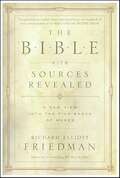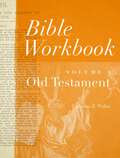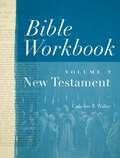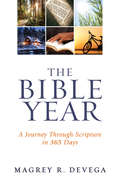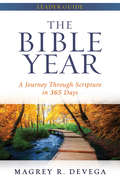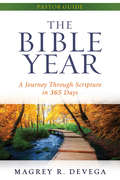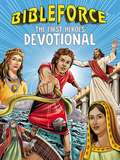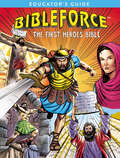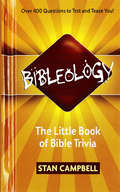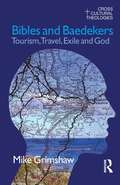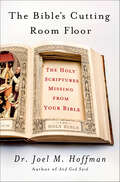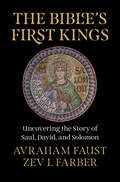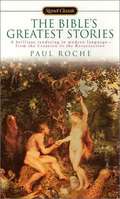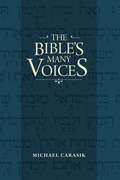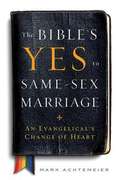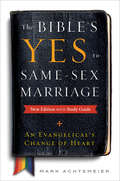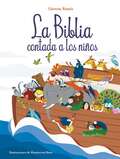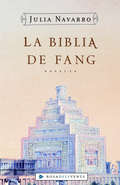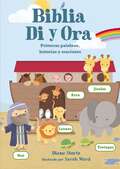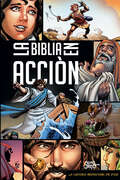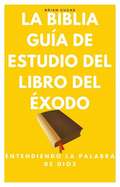- Table View
- List View
The Bible with Sources Revealed: A New View into the Five Books of Moses
by Richard Elliott FriedmanThis groundbreaking volume of the Five Books of Moses shows and explains how the source texts were compiled: &“A fundamental resource&” (Peter Machinist, Harvard University). For centuries, biblical scholars have worked on discovering how the Bible came to be. The consensus among a broad range of experts is known as The Documentary Hypothesis: the idea that ancient writers produced documents of poetry, prose, and law over many centuries, which editors then used as sources to fashion the books of the Bible that people have read for the last two thousand years. In The Bible with Sources Revealed, eminent scholar Richard Elliott Friedman offers a new, visual presentation of the Five Books of Moses—Genesis, Exodus, Leviticus, Numbers, and Deuteronomy—unlocking the complex and fascinating tapestry of their origins. Different colors and type styles allow readers to easily identify each of the distinct sources, showcasing Friedman's highly acclaimed and dynamic translation. This unique Bible provides a new means to explore the riches of scripture by: •Making it possible to read the source texts individually, to see their artistry, their views of God, Israel, and humankind, and their connection to their moment in history •Presenting the largest collection of evidence ever assembled for establishing and explaining the Documentary Hypothesis •Showing visually how the Bible was formed out of these sources •Helping readers appreciate that the Bible is a rich, complex, beautiful work as a result of the extraordinary way in which it was created.
Bible Workbook Vol. 1 Old Testament: Volume 1 Old Testament
by Catherine B. WalkerNOW WITH UPDATED, FULL-COLOR MAPSThe Bible Workbooks are a systematic, individual study of the Bible, providing a thorough biblical understanding. The student learns by doing; information is given and questions are asked to test their understanding. Bible Workbook Volume 1 gives an overview and a book-by-book study of the Old Testament. Interesting, stimulating, and informative, Bible Workbooks provide an understandable and enjoyable means of personal Bible study.
Bible Workbook Vol. 1 Old Testament: Volume 1 Old Testament
by Catherine B. WalkerNOW WITH UPDATED, FULL-COLOR MAPSThe Bible Workbooks are a systematic, individual study of the Bible, providing a thorough biblical understanding. The student learns by doing; information is given and questions are asked to test their understanding. Bible Workbook Volume 1 gives an overview and a book-by-book study of the Old Testament. Interesting, stimulating, and informative, Bible Workbooks provide an understandable and enjoyable means of personal Bible study.
Bible Workbook Vol. 2 New Testament
by Catherine B. WalkerNOW WITH UPDATED, FULL-COLOR MAPSThe Bible Workbooks are a systematic, individual study of the Bible. The student learns by doing; information is given and questions are asked to test their understanding. Bible Workbook Volume 2 gives an overview and a book-by-book study of the New Testament. Interesting, stimulating, informative- Bible Workbooks provide an understandable and enjoyable means of personal Bible study.
Bible Workbook Vol. 2 New Testament
by Catherine B. WalkerNOW WITH UPDATED, FULL-COLOR MAPSThe Bible Workbooks are a systematic, individual study of the Bible. The student learns by doing; information is given and questions are asked to test their understanding. Bible Workbook Volume 2 gives an overview and a book-by-book study of the New Testament. Interesting, stimulating, informative- Bible Workbooks provide an understandable and enjoyable means of personal Bible study.
The Bible Year Devotional: A Journey Through Scripture in 365 Days
by Magrey DeVegaThe Bible. 365 days. You. Yes, you! Not the type to sit down and read the entire Bible? Yes, the goal is to read the whole Bible in a year, but think about it in terms of smaller, daily goals. Think about a commitment to read a short selection from the Bible plus a concise devotional every day. You can do that – especially since The Bible Year has it all mapped out for you day by day. Plus, you’ll also get summaries of key themes and ideas to help you better digest and understand your readings. So you’re not just reading verse after verse, you’re enriching your spiritual life, developing a deeper faith and forming a closer connection to God and to each other. The Bible Year is also a wonderful way for small groups or even individuals to grow closer to God, while providing a common thread that will promote new and deeper friendships among members. Additional resources sold separately include a Leader Guide with discussion questions for small groups and a Pastor's Guide for a church-wide emphasis. Daily Bible goals start here! Praise for The Bible Year When it comes to read-through-the-Bible-in-a-year programs, The Bible Year is a game changer. Packed with devotionals, discussion guides, and resources for pastors, this beautifully written book makes journeying through Scripture less daunting and more rewarding. It’s the perfect companion for those who wish to read through the Bible for the first time or those seek to go deeper in their study of Scripture together with others. – Ryan P. Bonfiglio, Director of the Candler Foundry and Assistant Professor of Old Testament, Candler Theological Seminary With a pastor’s devotion to God and the people he serves, deVega has structured a truly helpful guide for reading the Bible in the span of a year. The thoughtful format is well designed to encourage steady progress in reading, and provoke thoughtful reflection. Brief section summaries allow the reader to stay on top of the larger story line, and thoughtful questions and blank spaces support a meditative encounter. This book is a welcome gift for anyone who wants to grow in faithfulness and devotion. – Melody D. Knowles, Vice President of Academic Affairs and Associate Professor of Old Testament, Virginia Theological Seminary
The Bible Year Leader Guide: A Journey Through Scripture in 365 Days
by Magrey DeVegaThe Bible. 365 days. You. Yes, you! Not the type to sit down and read the entire Bible? Yes, the goal is to read the whole Bible in a year, but think about it in terms of smaller, daily goals. Think about a commitment to read a short selection from the Bible plus a concise devotional every day. You can do that – especially since The Bible Year has it all mapped out for you day by day. Plus, you’ll also get summaries of key themes and ideas to help you better digest and understand your readings. So you’re not just reading verse after verse, you’re enriching your spiritual life, developing a deeper faith and forming a closer connection to God and to each other. The Bible Year is also a wonderful way for small groups or even individuals to grow closer to God, while providing a common thread that will promote new and deeper friendships among members. The Leader Guide contains 52 weeks of small group sessions based on the readings. Each session follows a concise, simple, and consistent lesson plan with discussion questions on the scriptures and instructions for using the videos if desired. Additional resources sold separately include a Devotional for every-day use and a Pastor's Guide for a church-wide emphasis.Daily Bible goals start here! Praise for The Bible Year When it comes to read-through-the-Bible-in-a-year programs, The Bible Year is a game changer. Packed with devotionals, discussion guides, and resources for pastors, this beautifully written book makes journeying through Scripture less daunting and more rewarding. It’s the perfect companion for those who wish to read through the Bible for the first time or those seek to go deeper in their study of Scripture together with others. – Ryan P. Bonfiglio, Director of the Candler Foundry and Assistant Professor of Old Testament, Candler Theological Seminary With a pastor’s devotion to God and the people he serves, deVega has structured a truly helpful guide for reading the Bible in the span of a year. The thoughtful format is well designed to encourage steady progress in reading, and provoke thoughtful reflection. Brief section summaries allow the reader to stay on top of the larger story line, and thoughtful questions and blank spaces support a meditative encounter. This book is a welcome gift for anyone who wants to grow in faithfulness and devotion. – Melody D. Knowles, Vice President of Academic Affairs and Associate Professor of Old Testament, Virginia Theological Seminary
The Bible Year Pastor Guide: A Journey Through Scripture in 365 Days
by Magrey DeVegaThe Bible. 365 days. You. Yes, you! Not the type to sit down and read the entire Bible? Yes, the goal is to read the whole Bible in a year, but think about it in terms of smaller, daily goals. Think about a commitment to read a short selection from the Bible plus a concise devotional every day. You can do that – especially since The Bible Year has it all mapped out for you day by day. Plus, you’ll also get summaries of key themes and ideas to help you better digest and understand your readings. So you’re not just reading verse after verse, you’re enriching your spiritual life, developing a deeper faith and forming a closer connection to God and to each other. The Bible Year is also a wonderful way for small groups or even individuals to grow closer to God, while providing a common thread that will promote new and deeper friendships among members. The Pastor’s Guide supports pastors in creating a churchwide program built around The Bible Year. It includes aids for sermon prep and ideas for integrating the program with church seasons and calendar year, as well as tips for gathering study groups, ideas for involving children and youth, and how you can use a shared journey through Scripture to bring your congregation together. The Bible Year product line includes a devotional for each church member, a leader guide for small group breakout sessions, and a pastor’s guide.Daily Bible goals start here! Praise for The Bible Year When it comes to read-through-the-Bible-in-a-year programs, The Bible Year is a game changer. Packed with devotionals, discussion guides, and resources for pastors, this beautifully written book makes journeying through Scripture less daunting and more rewarding. It’s the perfect companion for those who wish to read through the Bible for the first time or those seek to go deeper in their study of Scripture together with others. – Ryan P. Bonfiglio, Director of the Candler Foundry and Assistant Professor of Old Testament, Candler Theological Seminary With a pastor’s devotion to God and the people he serves, deVega has structured a truly helpful guide for reading the Bible in the span of a year. The thoughtful format is well designed to encourage steady progress in reading, and provoke thoughtful reflection. Brief section summaries allow the reader to stay on top of the larger story line, and thoughtful questions and blank spaces support a meditative encounter. This book is a welcome gift for anyone who wants to grow in faithfulness and devotion. – Melody D. Knowles, Vice President of Academic Affairs and Associate Professor of Old Testament, Virginia Theological Seminary
BibleForce Devotional: The First Heroes Devotional
by Tama FortnerBibleForce Devotional includes 100 devotions based on the heroes of the Bible with the popular comic-style action art, facts about each hero, Scriptures, and action items that help kids connect God's Word to their lives today. As kids read about the heroes of the Bible, they'll see ways they can be heroes for God as well.BibleForce Devotional offers a fresh, bright graphic-novel style that will interest boys and girls alike and will be the perfect way to engage young readers who want an active, exciting devotional. It's a great book to read together and is simple enough for young readers to read on their own. Kids won't be able to put down this book! Jump into the story of God’s Word, and become an amazing hero for God today with BibleForce Devotional! <P><P> <i>Advisory: Bookshare has learned that this book offers only partial accessibility. We have kept it in the collection because it is useful for some of our members. Benetech is actively working on projects to improve accessibility issues such as these.</i>
BibleForce Educator's Guide: The First Heroes Bible
by Thomas NelsonBibleForce Educator's Guide is a companion to BibleForce: The First Heroes Bible. This guide can be utilized in the classroom, in a home school setting, or by parents seeking additional resources. Ideal for children, 6-10.
Bibleology: The Little Book of Bible Trivia
by Stan CampbellPeople who love trivia games won't be able to put down BIBLEOLOGY, which contains dozens of test-your-knowledge questions. Whether you consider yourself a novice or an expert, BIBLEOLOGY is an engaging way to get more familiar with this fascinating collection of people's interactions with the God of the universe.
Bibles and Baedekers: Tourism, Travel, Exile and God
by Michael GrimshawContemporary tourism and travel have become a form of religion, a new opiate of the masses. However, could Church and theology be religious forms of tourism and travel? 'Bibles and Baedekers' offers a theology of tourism and exile for a modern and postmodern world. It examines the ways in which location, identity and movement have made use of religious texts and metaphor and questions the relative absence of secular texts and ideas in theology. The theology of the tourist and traveller is one of new experiences, the acquisition of identity through movement. 'Bibles and Baedekers' uniquely applies this to the postmodern Christian, embodying the fulfilment of Bonhoeffer's 'religionless Christianity', dislocated from both a secular and 'religious' world.
The Bible's Cutting Room Floor: The Holy Scriptures Missing from Your Bible
by Joel M. HoffmanThere’s more to the story: A scholar and translator reveals the history of the Bible—and the parts that were left out, by accident or design.The Bible you usually read is not the complete story: Some holy writings were left out for political or theological reasons, others simply because of the physical restrictions of ancient bookmaking technology. At times, the compilers of the Bible skipped information that they assumed everyone knew. Some passages were even omitted by accident. In The Bible’s Cutting Room Floor, acclaimed translator Dr. Joel M. Hoffman gives us the stories and other texts that didn’t make it into the Bible even though they offer penetrating insight into the Bible and its teachings.The Book of Genesis tells us about Adam and Eve’s time in the Garden of Eden, but not their saga after they get kicked out or the lessons they have for us about good and evil. The Bible introduces us to Abraham, but it doesn’t include the troubling story of his early life, which explains how he came to reject idolatry to become the father of monotheism. And while there are only 150 Psalms in today’s Bible, there used to be many more.Dr. Hoffman deftly brings these and other ancient scriptural texts to life, exploring how they offer new answers to some of the most fundamental and universal questions people ask about their lives. An impressive blend of history, linguistics, and religious scholarship, The Bible’s Cutting Room Floor reveals what’s missing from your Bible, who left it out, and why it is so important.“Hoffman also provides an accessible and entertaining history of the context in which the ‘rejected’ works arose, a fascinating account of how the Dead Sea Scrolls came to light in the mid-20th century (and what they include), an analysis of Josephus’s contributions to history, and the relationship between the Septuagint (the Greek translation of the Bible) and the Hebrew Scriptures.” —Publishers Weekly“A wonderful book to confirm the beliefs of the faithful, to strengthen those whose faith begs for more information and to enlighten those who reject the stories of the Bible as mere fiction.” —Kirkus Reviews
The Bible's First Kings: Uncovering the Story of Saul, David, and Solomon
by Avraham Faust Zev I. FarberSaul, David, and Solomon are dominant figures in the Hebrew Bible, rulers of an expanding Israelite polity before it dissolved into two separate kingdoms. Saul's paranoid jealousy, David's killing the Philistine champion Goliath with a slingshot, and Solomon's meeting the Queen of Sheba are familiar stories to many people, but what is the truth behind the texts? While scholars long believed these three monarchs to have been historical personalities, over the past three decades many have questioned the historicity of this United Monarchy, some doubting even the existence of its founding fathers. This book robustly argues that the Israelite kingdom of the Bible was a real mini-empire, and that Saul, David, and Solomon were kings of consequence – even if the biblical stories reimagine their lives to glorify and vilify them. Combining fresh archaeological evidence with astute readings of key texts, the authors offer a compelling reconstruction of this fascinating ancient polity which, though it lasted less than a hundred years, has bequeathed a remarkable religious and cultural legacy to the western world. Written in a clear and engaging style, this book will be of interest to scholars and general audiences alike.
The Bible's Greatest Stories
by Paul RocheFrom the awe-inspiring story of the Creation to the defeats and triumphs of the Children of Israel and the life, death, and Resurrection of Jesus, here are the greatest accounts from the greatest book ever written, presented in an accessible form for contemporary readers. Enhanced with annotations, Paul Roche's brilliant retelling of these stories is at once impeccably accurate and vibrantly told. He brings to life the saga of Joseph and the coat of many colors, the drama of the fall of Jericho, the heroism of a young David fighting Goliath and the lust of an older David for Bathsheba, the glory and wisdom of Solomon, the bravery of Judith, the dark despair of Job, the faith of Daniel in the lion's den, the joy of the Nativity, and the miracle of the Resurrection. These are just a few of the many great biblical stories presented in this masterful translation by a distinguished poet and scholar.
The Bible's Many Voices
by Michael CarasikThe most common English translations of the Bible often sound like a single, somewhat archaic voice. In fact, the Bible is made up of many separate books composed by multiple writers in a wide range of styles and perspectives. It is, as Michael Carasik demonstrates, not a remote text reserved for churches and synagogues but rather a human document full of history, poetry, politics, theology, and spirituality. Using historic, linguistic, anthropological, and theological sources, Carasik helps us distinguish between the Jewish Bible’s voices—the mythic, the historical, the prophetic, the theological, and the legal. By articulating the differences among these voices, he shows us not just their messages and meanings but also what mattered to the authors. In these contrasts we encounter the Bible anew as a living work whose many voices tell us about the world out of which the Bible grew—and the world that it created.Listen to the author's podcast.
The Bible's Yes to Same-Sex Marriage: An Evangelical's Change of Heart
by Mark AchtemeierIn the early 2000's, Mark Achtemeier embarked on a personal journey with the Bible that led him from being a conservative, evangelical opponent of gay rights to an outspoken activist for gay marriage and a fully inclusive church. In The Bible's Yes to Same-Sex Marriage, Achtemeier shares what led to his change of heart: the problems with excluding groups of people and the insights into the Bible's message that led him to recognize the fullness of God's love and support for LGBT persons. Readers will discover how reading snippets of Scripture out of context has led to false and misleading interpretations of the Bible's message for gay people. Achtemeier shows how a careful reading of the whole Scripture reveals God's good news about love, marriage, and sexuality for gay and straight people alike.
The Bible’s Yes to Same-Sex Marriage: An Evangelical's Change Of Heart
by Mark AchtemeierIn the early 2000's, Mark Achtemeier embarked on a personal journey with the Bible that led him from being a conservative, evangelical opponent of gay rights to an outspoken activist for gay marriage and a fully inclusive church. In The Bible's Yes to Same-Sex Marriage, Achtemeier shares what led to his change of heart: the problems with excluding groups of people and the insights into the Bible's message that led him to recognize the fullness of God's love and support for LGBT persons. Readers will discover how reading snippets of Scripture out of context has led to false and misleading interpretations of the Bible's message for gay people. Achtemeier shows how a careful reading of the whole Scripture reveals God's good news about love, marriage, and sexuality for gay and straight people alike.
La BIBLIA "Antiguo testamento" contado a los niños (Clásicos contados a los niños)
by Rosa Navarro Durán Francesc Rovira Francesc Rovira i JarquéLA BIBLIA es el libro de los libros, son las Sagradas Escrituras, es un tesoro que sobrepasa su extraordinario valor literario, de una belleza y una fuerza innegables. A lo largo de breves capítulos, los niños y niñas recorrerán las historias que componen el Antiguo Testamento. Las expresivas ilustraciones llenan de emoción y ternura los pasajes, y les permitirán disfrutar como nunca con esta lectura.
La BIBLIA contada a los niños (Clásicos contados a los niños)
by Rosa Navarro Durán Francesc Rovira Francesc Rovira i JarquéLA BIBLIA es el libro de los libros, son las Sagradas Escrituras, es un tesoro que sobrepasa su extraordinario valor literario, de una belleza y una fuerza innegables. A lo largo de breves capítulos, los niños y niñas recorrerán las historias que componen tanto el Antiguo Testamento como el Nuevo Testamento. Las expresivas ilustraciones llenan de emoción y ternura los pasajes, y les permitirán disfrutar como nunca con esta lectura.
La Biblia contada a los niños: Historias del Antiguo Testamento y Nuevo Testamento
by Llorenç Ramis¡Una recopilación de historias de la Biblia para toda la familia! Disfruta en familia de los relatos más contados de la historia, con preciosas ilustraciones y un lenguaje adaptado a los más pequeños. Desde la creación del mundo hasta las enseñanzas de Jesús, estas historias son ideales para compartir los valores de respeto, generosidad y tolerancia que tan necesarios son en nuestros días. Faraones, leones y diluvios universales... En estas páginas exquisitamente ilustradas, los héroes del Antiguo y el Nuevo Testamento protagonizan relatos que con su simbología han definido la civilización en la que vivimos. El regalo perfecto para los más pequeños en el día de su Primera Comunión, ¡un recuerdo muy especial!
La BÍblia de Fang
by Julia NavarroA Roma, un home es confessa: «Pare, macuso perquè mataré un home...».Al mateix temps Clara Tannenberg, una jove arqueòloga néta dun home poderós amb un passat fosc, anuncia en un congrés el descobriment dunes tauletes que, si són autèntiques, seran la prova científica de lexistència del patriarca Abraham: és lobra dun escriba que va recollir el relat del profeta sobre la creació del món, la confusió de les llengües a Babel y el diluvi universal. Una auténtica Bíblia de Fang. Amb un equip darqueòlegs, i poc abans de linici de lúltima guerra del Golf, Clara posa en marxa unes excavacions arriscades quefan que nhi hagi molts que vulguin acabar amb la seva vida i la del seu avi: des de traficants dart milionaris fins a quatre amics que no claudicaran fins a culminar una venjança implacable.Després de lespectacular èxit de La germandat del Sant Sudari, Julia Navarro es consagra amb aquesta novel·la electritzant, en laqual el lector viatjarà fins als temps bíblics passant per lEuropa de la Segona Guerra Mundial, Egipte, Síria, els Estats Units, Itàlia, França, Espanya i lIraq de Saddam.
Biblia Di y Ora: Primeras palabras, historias y oraciones
by Diane StortzHistorias bíblicas sencillas para niños de uno a cuatro años de edad, presentadas con texto fácil de comprender e imágenes coloridas para que los niños las señalen, nombren y aprendan. Una herramienta atractiva para que los padres enseñen a sus hijos la palabra de Dios en una forma entretenida y adecuada para su edad. Escucha la historia bíblica, repite el versículo, ora y encuentra los objetos clave en cada página.¡Lea y aprenda de la Biblia con sus hijos! Experimente la Biblia junto a sus niños en una manera nueva y diferente. Los niños disfrutarán señalando y nombrando objetos en cada página para el aprendizaje temprano. Lo que es más importante, descubrirán sus historias bíblicas favoritas, apropiadas para su edad con versículos de las Escrituras y oraciones breves que también guardan la Palabra de Dios en los corazones de los niños.
La Biblia en acción: The Action Bible Spanish Edition (Action Bible Series)
by Sergio CarielloCon más de 230 relatos bíblicos en orden cronológico y en formato de novela gráfica, La Biblia en acción edición ampliada en español ha ganado la reputación de entusiasmar tanto a niños, adolescentes, buscadores espirituales como a los amantes de los libros de historietas mientras descubren una vida de aventuras con Dios. Esta famosa edición ampliada de La Biblia en acción mejora la edición original al incluir: Historias adicionales del Antiguo Testamento sobre el viaje de Agar, las decisiones que tomaron las parteras en los días de Moisés y que cambiaron el mundo, y otras maneras en que Dios obró a través de Su pueblo.Fascinantes conexiones entre la historia de David y sus salmos.Un Nuevo Testamento actualizado que incluye parábolas y milagros previamente inexplorados.Más ilustraciones e información inspiradora acerca de las mujeres en la Biblia.Mapas mejorados para referencias más sencillas. 19 historias adicionales y 22 narraciones ampliadas junto con nuevas y llamativas ilustraciones de Sergio Cariello hacen de La Biblia en acción edición ampliada una singular manera de profundizar en la Palabra de Dios.With more than 230 chronological biblical narratives in the form of a graphic novel, The Action Bible Spanish Expanded Edition has gained a reputation for sparking excitement in kids, teens, seekers, and comic book lovers alike as they discover an adventurous life with God. This popular expanded edition of The Action Bible builds on the original to include: Additional Old Testament stories about Hagar&’s journey, the world-changing choices of the midwives in Moses&’s day, and other ways God worked through His people.Fascinating connections between David&’s story and his psalmsA refreshed New Testament including previously unexplored parables and miraclesMore empowering information and illustrations about women in the BibleEnhanced maps for easier reference An additional 19 stories and 22 expanded narratives, along with bold new illustrations from Sergio Cariello, make The Action Bible Expanded Edition a unique way to dig into God&’s Word.
La Biblia, Guía de Estudio del Libro del Éxodo: Entendiendo la Palabra de Dios
by Brian GugasLa Biblia, Guía de Estudio del Libro del Éxodo, es parte de la serie de libros de Brian Gugas, que nos ayuda a tener una mayor comprensión de la maravillosa Palabra de Dios. Como el mismo Autor lo dirá, es un Libro de Comienzos y Finales. Por sus particulares características, también es un libro que nos transporta al lugar, tras bambalinas, de la historia que se desarrolla y nos aclara el panorama de todo lo que ocurre en este increíble peregrinaje. Nos corre distintos velos que la brecha del tiempo y lo cultural no nos permitían vislumbrar completamente, y profundiza la urgencia de ser consientes de la demanda de Dios hacia nosotros por rendirnos completamente a Su Voluntad.
